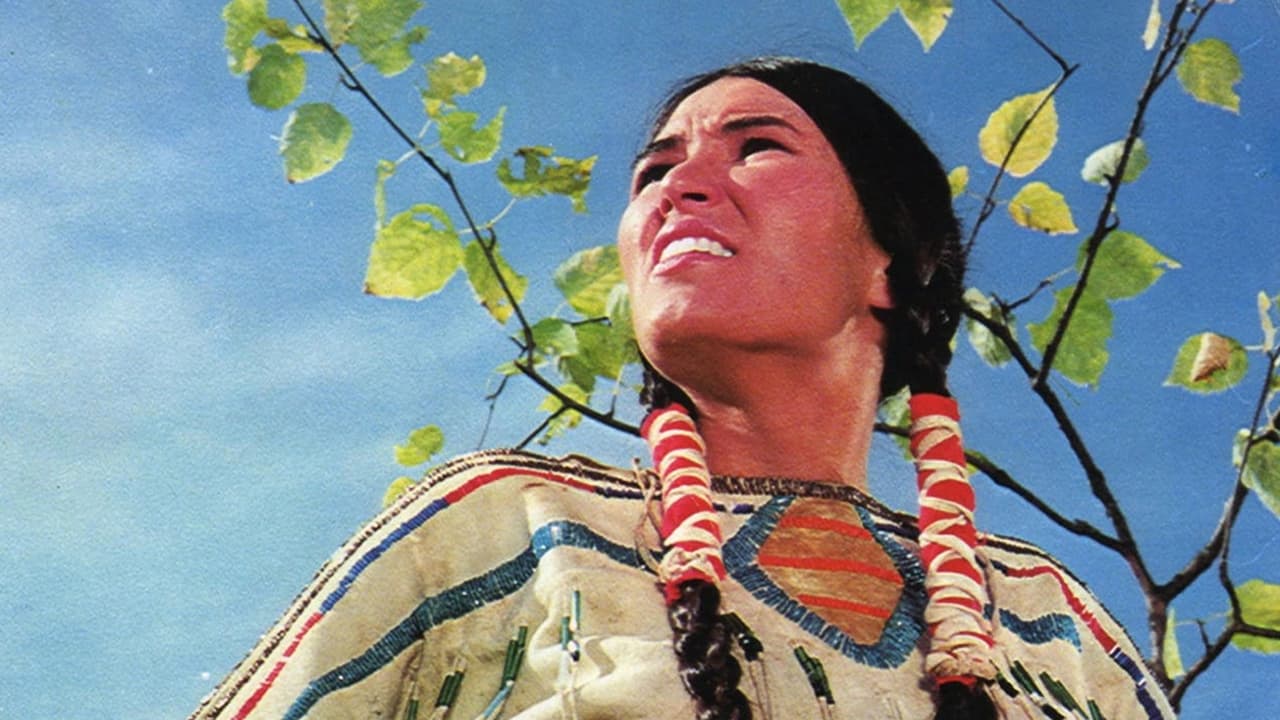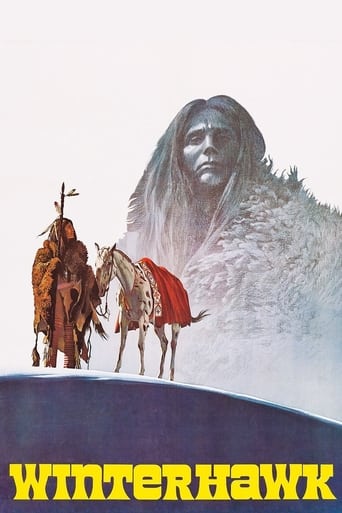

RELEASED IN 1975 and written/directed by Charles Pierce, "Winterhawk" chronicles events in western Montana in the 1840s when small pox breaks out in a remote tribe of Blackfoot. The titular chief (Michael Dante) goes to the New Americans to apprehend a remedy, but things don't go well and a movie-length chase ensues. Dawn Wells from Gilligan's Island plays the female lead while Leif Erickson plays a mountain man who's friends with the Blackfoot. Woody Strode, Denver Pyle, L.Q. Jones & Elisha Cook Jr. have peripheral roles.While watching, I was reminded of 1977's "Grayeagle" and therefore wasn't surprised to discover that Pierce made both films. "Grayeagle" is superior, though, and it shows that Pierce learned a thing or two while making this one two years earlier.The movie has its points of interest, like a notable cast, with great alpine locations and moments of aesthetic wonder. But it's marred by a sometimes draggy vibe with overly syrupy moments and a blaring piano-oriented score that starts to grate due to its booming redundancy. Moreover, Winterhawk (the character) is depicted as excessively mysterious, noble and superhuman, not to mention more time needed spent on his group in the chase for the simple sake of human interest. If you can handle these cavils, however, this is a worthwhile Western.Some have pointed out that "Winterhawk" is noteworthy because of its respectful view of Native Americans (who aren't really 'native' since their ancestors emigrated from Asia), yet pro-Indian Westerns actually go back to "Buffalo Bill" (1944), "Fort Apache" (1948), "Broken Arrow" (1950) and "The Last Wagon" (1956), not to mention the more contemporaneous "A Man Called Horse" (1970) and "I Will Fight No More Forever" (1975).THE FILM RUNS 98 minutes and was shot in Kalispell & Browning, Montana, and Durango & Silverton, Colorado.GRADE: B-
... View MoreIt is almost too realistic but they really contorted over depicting each side's point of view.I thought I read this was made for 0.858 and released in Sweden, can that be right? I'm going to go looking for the box office... right... now.Dawn Wells in Winterhawk reminds me of Elaine Benes on a Peterman excursion.Cotton will be alright? I thought he was speared right where most people never want to be spearedHard to believe I just happened to see the end.
... View MoreI absolutely don't agree with all the sour apple reviews of this movie. Yes, it definitely has its flaws, but on the whole, I love it - the stirring musical score, the Winterhawk song, the gorgeous scenery, the story, and especially the slow motion sequences displaying Michael Dante's dazzling horsemanship - which was why I saw it 7 times in the theater when it first came out. Well known Chicago film critic Roger Ebert gave this movie three stars! I definitely don't agree with all of Roger's reviews. In fact, I've disagreed very strongly more often than not. But his review of Winterhawk was glowing! I suggest you read it!Movies / Roger Ebert / October 8, 1975 "Winterhawk" is a traditional Western, simply and well told, almost old-fashioned in the clarity of its narrative. An hour or so into it, there's a scene where a group of mountain men are gathered around a campfire, drinking coffee and huddling beneath their blankets for warmth, and something about the look and sound of them reminded me of the classic Westerns of John Ford. This could, indeed, almost be a Western from 20 or 30 years ago, if it weren't for its sympathetic and evenhanded treatment of Indians. The movie takes place very early in the 19th Century, when most of the West was known only to its Indian inhabitants and a few white trappers and traders and mountain men: Neither the farmers nor the cowmen had arrived to start their disagreements. There's a good attempt to be halfway authentic in terms of the period (although the movie's women apparently have found a supply of eyeliner out there in the wilderness), and the characters aren't burdened with all the heavy symbolism, of latter-day Westerns. The story involves a Blackfoot chief, Winterhawk, who takes furs to trade with the white man in exchange for medicine to fight a smallpox epidemic that's decimating his tribe. He's double-crossed, his furs are stolen and, in revenge, he kidnaps a white woman and her young brother and disappears back into the mountains. Their trek leads them past all sorts of glorious scenery, accompanied by appropriately heroic music. The movie's great to look at. A pursuit party sets off to find Winterhawk and "rescue" the woman and boy (who increasingly don't seem to need rescuing), and the filmmaker, Charles Pierce populates the party and the stops along with way with a gallery of great Western character actors. You may not know them all by name - but, believe me, you've seen them in the forts and stagecoaches and saloons and jails of countless Westerns: Denver Pyle, Lief Erickson, Woody Strode, Elisha Cook Jr., L. Q. Jones, Arthur Hunnicutt - the only ones missing are Strother Martin and good old Dub Taylor. Winterhawk is played by Michael Dante, who uses the strong-and-silent routine for all it's worth: It may be a cliché of a performance, but it works, and it's interesting for once to find a movie Indian who speaks in an Indian language that has to be translated for the other characters. He and the girl, Dawn Wells, exchange many meaningful glances and mutual silences before the movie's ending (which is a happy one, the exception in these cases). There's a love interest, but it's underplayed and allowed to develop convincingly, so we don't mind too much. The movie works directly and doesn't attempt to sneak allegories and messages past us. That makes it all the more convincing after the lugubrious "The Master Gunfighter," which turns up dubious "historical facts," works them into a plot lifted from a samurai drama and has the gall to pass itself off as a meaningful statement. Sometimes the best stories are the ones most simply told. -------So there you have it!Rita Raffanti
... View MoreYou are wrong! This is a great movie! I watched it again and again. I loved the scenery. And the music was beautiful. I love Dawn Wells and thought she was great in this part. A wonderful story that gives a sympathetic view of the American Indian.
... View More